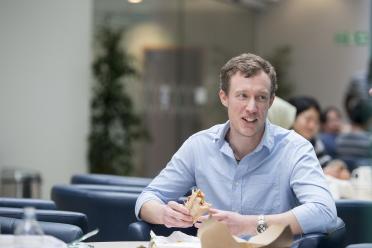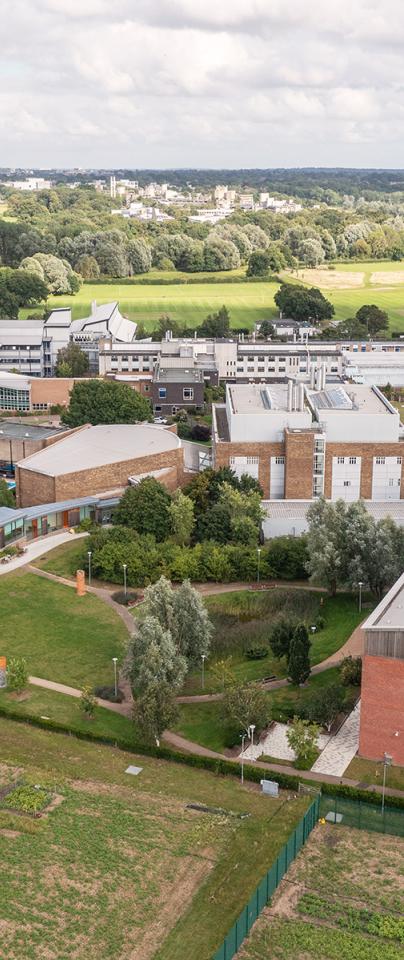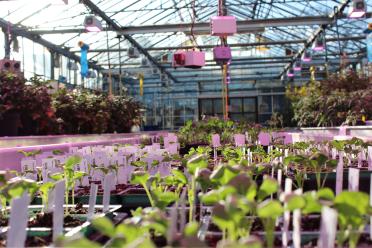Pop Group 55: let’s get together and feel alright
Earlham Institute, the John Innes Centre and UEA are delighted to host the 55th annual Population Genetics Group meeting, where community is key.
Earlham Institute, the John Innes Centre and UEA are delighted to host the 55th annual Population Genetics Group meeting, where community is key.
Mark McMullan joins us, at a social distance, on the benches next to the Earlham Institute that bask in the optimistic late summer sunshine, tempting out the bees for one last foray amongst what flowers remain belatedly in bloom.
He hopes, this year, that flowers - plants and their pathogens, in fact - will make a big splash at Pop Group 55, a meeting that brings together a thriving community of population geneticists, and many more besides, to share the stories of their research. And, more importantly still, to share good times.
So, what can we look forward to next January, and how can we recapture that sense of community after two years of virtual meetings?
“The community is the best thing about this event,” says Mark, harking back to happy times spent with peers across the country.
He explains that one of the best things about Pop Group is that it’s a great leveller. Anyone at any career stage is invited to give a talk, and talks are granted on a first come, first served basis.
“Popgroup is the perfect ‘Goldilocks’ size of conferences,” agrees David Richardson of UEA, who is co-hosting the event along with Mark and Thomas Mathers of JIC. “It’s not too big, not too small… and the bears are all very friendly!
“It also helps that the conference also has a strong ethos of being informal, helping early career researchers present their work and allowing easy interaction and discussion. It’s a great place for students and postdocs to gain confidence.”
“The huge appeal of Pop Group is its grassroots nature,” Mark continues. “It’s organised by the community, for the community, so it’s all pretty organic.
“It’s also a lot of fun. Yes, we talk about science and make important networks there. But there are memories and connections to be made, too. I’ll never forget some of the hilarious moments during the annual Ceilidh.”

The 55th installment, Population Genetics Group 55, takes place in January 2022 and features three exciting plenary talks from speakers worldwide.
Professor Eva Stukenbrock of the University of Kiel and the Max Planck Institute of Evolutionary Biology, Germany, will kick things off with a talk on the “rapid evolution of pathogens in agricultural ecosystems”.
Birds are covered, too, as Professor Scott V. Edwards of Harvard University discusses “evidence for selection and constraint in bird genomes. Dr Alexander Suh of UEA and the University of Uppsala rounds off the headliners, asking “germline/soma line differences: why bother to eliminate DNA?”
Though it was coined “population genetics group” in the 1960s, really pretty much all aspects of evolutionary genetics and genomics are covered these days. If you want to give a talk, a poster, or both, then you can submit a 250 word abstract at registration.
Registration is open from 18 October until 12 December, though we’d ask for any abstracts by 30 November. You can get an idea of past topics by taking a look at some of the programmes from previous meetings.


The huge appeal of Pop Group is its grassroots nature, it’s organised by the community, for the community, so it’s all pretty organic.

Image shows aerial view of Norwich Research Park with Earlham Institute in bottom right corner, and John Innes Centre, centre back. Credit: Anglia Innovation Partnership.
This is set to be the second virtual installment of Pop Group, as people rightly continue to be cautious about travel and large events as the pandemic continues. However, this year Mark hopes we can rekindle that sense of togetherness.
“We’ll have all the talks online, but what we’re really encouraging is local groups getting together to enjoy the event,” he says. “There are PhD students that have been working remotely, missing out on faculty seminars and journal clubs, and that all important face-to-face interaction. This is so important for our professional development, so we really do want people to go to that extra effort, if they can”.
It might be researchers in the same institute, or the same city. The idea is that even though we can’t all be together at the one venue, we might be able to have smaller local meetups.
“Purely online conferences have been a bit soul destroying,” says David, who is looking forward especially to these meetups. “from a social point of view, sharing the enthusiasm and excitement of science being revealed and discussed together will just be so much more fun!
“As a PI, watching and discussing talks directly with my team will be great to help students clarify their thoughts and questions, and the hubs will allow easy discussion and informal interactions with students and local colleagues – something that is sorely needed.”
“We’ve all been isolated for so long, for very good reasons,” concludes McMullan. “While it’s important to be as safe as possible, and to do this event virtually again, we hope to enable some of the offline camaraderie that we’ve all really been missing.”
Register today for the event, or contact the organisers to find out more.
